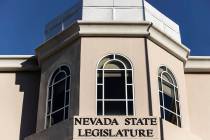Public pensions save taxpayers money
To the editor:
The Las Vegas Review-Journal's editorials on Nevada's Public Employees Retirement System missed the facts about the program and public pensions in general (Tuesday, Wednesday editions). With a better handle on the facts, it's doubtful that the Review-Journal would advocate moving future hires out of a retirement system that even a Las Vegas Chamber of Commerce report concedes is "well-managed and prudently administered."
With respect to the finances of Nevada PERS, the system is nearly 80 percent pre-funded. In recent testimony before Congress, the Government Accountability Office -- the investigative arm of Congress -- indicated that a public pension system that is funded at about 80 percent is considered to be financially sound. PERS is hardly a system in crisis.
It also seems that the Review-Journal and the chamber are unaware of the economics of pensions and the recent experiences of states that have experimented with changing their pension system.
States such as West Virginia, Nebraska and Alaska have learned the hard way that to jettison the tried-and-true defined-benefit pension model in favor of individual savings -- or defined-contribution accounts -- actually ends up costing taxpayers more and erodes retirement security. These states have switched, or are considering switching back to traditional pension systems, to reduce costs and ensure adequate retirement income for workers.
This trend is supported by a recent study on the economics of pensions we conducted that finds pensions can deliver the same level of retirement income at nearly half the cost of an individual defined-contribution plan. That's because group-based plans have built-in economic efficiencies that help drive down costs and enhance investment returns as compared with defined-contribution plans that rely on individual accounts.
Also, taxpayers and policymakers should be aware that "freezing" a pension plan can be extremely costly to taxpayers, especially in the short run. It starves the plan of new entrants and erodes the plan's ability to achieve superior investment returns. Also, accounting rules require the state to accelerate payments on their pension obligations when a plan is frozen.
At a time when Nevada faces an economic downturn, it seems illogical for legislators to put into motion actions that would raise pension costs. It would be like a financially strapped family accelerating payment on their mortgage when they can least afford it, and when there is no need.
Bottom line: A drastic retirement-system switch in Nevada is not only unnecessary, but harmful and costly. In other words, if it's not broke, don't break it.
Beth Almeida
WASHINGTON, D.C.
THE WRITER IS EXECUTIVE DIRECTOR OF THE NATIONAL INSTITUTE ON RETIREMENT SECURITY.
Pensions save money
To the editor:
The Review-Journal's John L. Smith was correct in pointing out that the mission of the Las Vegas Chamber of Commerce is "to strengthen, enhance and protect business in Nevada" (Tuesday column). But he was wrong when he said the researchers commissioned by the chamber had collected solid numbers regarding Nevada's Public Employees Retirement System and the pension funds of other states.
I am a retired teacher from Arizona. I know how much my pension is, and believe me when I say I could not live in Arizona, much less in Nevada, on the paltry amount the chamber's researchers say I am receiving. According to their research, an average Arizona teacher makes $17,500 per year in retirement after 30 years of service. In fact, Arizona teachers get credit for 2 percent for every year taught, and that translates to a pension of $30,000 per year after 30 years.
Arizona teachers also pay into Social Security. This means an additional $17,000 per year, for a total retirement income of $47,000.
The Review-Journal's related editorials appear to be more rants against public employees. Think about what it's worth to teach for 30 years in an overcrowded, underfunded classroom, where you have to pay for your own education to keep your license and even have to pay for many of your own classroom supplies.
Why would anyone even consider teaching under these conditions if, in their future, they were not promised a decent pension? The starting salary for teachers in Clark County won't rent them a decent apartment and pay off their student loans at the same time.
Bob Federoff
LAS VEGAS
It's only tax money
To the editor:
I can't believe we need five police officers to escort O.J. Simpson to court -- not counting how many are around the Regional Justice Center and in the courtroom (front-page photo, Wednesday Review-Journal). Just another expensive bill for the taxpayers of Las Vegas.
Then there's Bob Loux, director of the state's Nuclear Projects Agency, who gives out 16 percent raises to himself and his staff ("Raises put agency boss in trouble," Wednesday Review-Journal). I bet he wouldn't do that if it were his own money.
Daniel Skovira
LAS VEGAS























